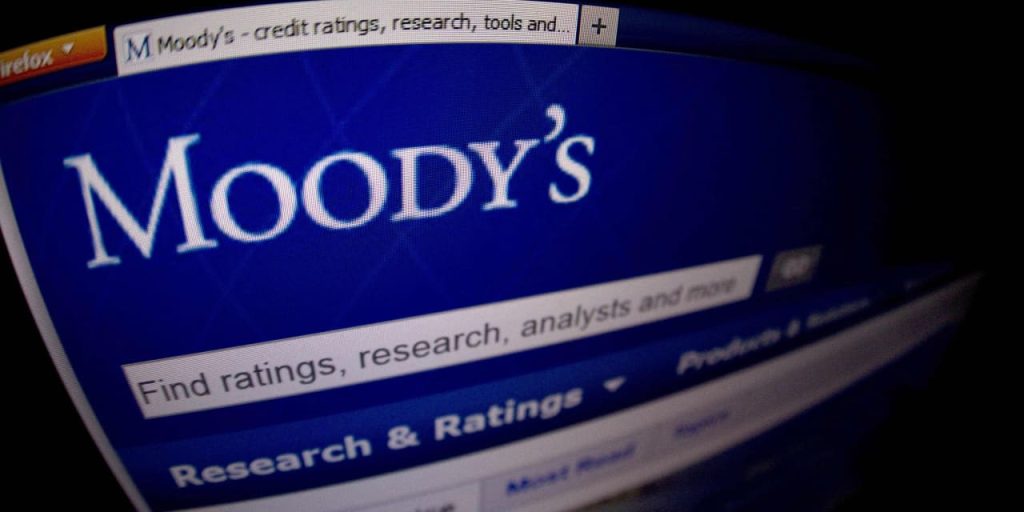Moody’s Investors Service cut its rating outlook to negative from stable on Bank of America Corp., JPMorgan Chase & Co. and Wells Fargo & Co., but the stocks rallied Tuesday on the heels of tame inflation data.
Meanwhile, bond prices of banks also climbed dramatically as yields fell, in another bullish move for the sector (see chart below).
Moody’s negative outlook on bank debt reflects “the potentially weaker capacity of the government of the United States of America (Aaa negative) to support the U.S.’s systemically important banks,” analyst Peter E. Nerby said in a research note published late Monday.
Moody’s kept in place its “Strong+” score for the macro profile of the U.S. banking system.
Moody’s said the downgrade of Bank of America
BAC,
-0.45%,
JPMorgan Chase
JPM,
+0.73%
and Wells Fargo
WFC,
+0.22%
aligns with its rating cut on Friday of U.S. sovereign debt to negative from stable.
Moody’s maintained its stable rating on Citigroup Inc.’s
C,
+0.30%
debt.
Bank of America’s stock was up 5.5% after a favorable consumer-price-index reading lifted financial markets, while JPMorgan Chase rose 1.8%, Wells Fargo gained 2.5% and Citigroup rose 3.9%.
The Financial Select Sector SPDR ETF
XLF
rose 1.9% and the SPDR S&P Regional Banking ETF
KRE
rallied by 7.4%.
Bank of America’s gain of 5.5% ranks as its largest percentage increase since the stock rose 6.06% on Oct. 17, 2022, according to Dow Jones Market Data.
Also in the banking sector, Goldman Sachs Group Inc.
GS,
+0.28%
rose 4.2% as the third-best performer among the 30 stocks in the Dow Jones Industrial Average
DJIA.
A potential upgrade of Bank of America debt would reflect the bank’s ability to sustain a strong and stable performance with profit and capital levels consistently stronger than peer averages, as well as maintenance of its conservative risk profile, a “superior” track record of controlling risk, consistency of management and its “strong” liquidity and funding profile, Nerby said.
Citigroup could see upward rating pressure if a corporate transformation now taking place under Chief Executive Jane Fraser is successful.
Moody’s said it will weigh factors at Citigroup such as the lifting of regulatory consent orders, a robust internal-control and risk-management environment that avoids risk-management failures that may affect its peers, maintenance of a restrained risk appetite and improved operating leverage.
JPMorgan runs a “complex” capital-markets business that could pose “substantial” creditor risks, Moody’s said.
Any potential upgrade in that bank’s baseline credit assessment “would depend on sustaining strong and stable performance and capital levels” above its peers, Moody’s said. Any upgrade of the bank’s baseline credit assessment would likely trigger an upgrade of JPMorgan Chase’s debt ratings, Moody’s said.
For its part, Wells Fargo’s debt remains highly rated, with upward price pressure not likely in the next 12 to 18 months, Moody’s said.
“[Wells Fargo] could be downgraded if it loses traction in remediating its legacy regulatory issues,” Moody’s said. “It could also be downgraded if it suffers a material deterioration in its deposit franchise or has an outsized spike in nonperforming assets, or if there is a material expansion into riskier activities relative to its other banking businesses.”
Major litigation or other operational-risk changes or a failure in controls could also affect its ratings, Moody’s said.
Along with higher bond prices for the big banks, the spread, or the difference between Treasury prices, has narrowed as investors bid up prices of the bank debt on Tuesday (see chart).
Also read: U.S. banks and regional lenders slide across the board as S&P is latest to downgrade ratings
Read the full article here




